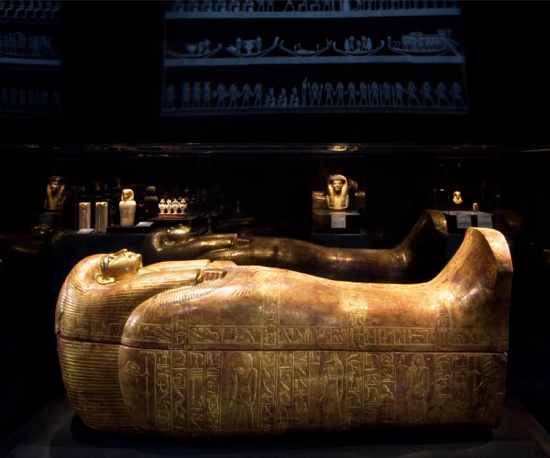 History
History  History
History  Health
Health 10 Everyday Activities That Secretly Alter Consciousness
 History
History Top 10 Historical Disasters Caused by Someone Calling in Sick
 Animals
Animals 10 New Shark Secrets That Recently Dropped
 Movies and TV
Movies and TV 10 Forgotten Realities of Early Live Television Broadcasts
 Technology
Technology 10 Stopgap Technologies That Became Industry Standards
 Weird Stuff
Weird Stuff 10 Wild Facts About Taxidermy That You Probably Didn’t Know
 Travel
Travel 10 Beautiful Travel Destinations (That Will Kill You)
 Miscellaneous
Miscellaneous 10 Modern Marriage Rituals Born from Corporate Branding
 Weird Stuff
Weird Stuff Ten Bizarre Visions of 2026 from Fiction
 History
History 10 “Modern” Problems with Surprising Historical Analogs
 Health
Health 10 Everyday Activities That Secretly Alter Consciousness
 History
History Top 10 Historical Disasters Caused by Someone Calling in Sick
Who's Behind Listverse?

Jamie Frater
Head Editor
Jamie founded Listverse due to an insatiable desire to share fascinating, obscure, and bizarre facts. He has been a guest speaker on numerous national radio and television stations and is a five time published author.
More About Us Animals
Animals 10 New Shark Secrets That Recently Dropped
 Movies and TV
Movies and TV 10 Forgotten Realities of Early Live Television Broadcasts
 Technology
Technology 10 Stopgap Technologies That Became Industry Standards
 Weird Stuff
Weird Stuff 10 Wild Facts About Taxidermy That You Probably Didn’t Know
 Travel
Travel 10 Beautiful Travel Destinations (That Will Kill You)
 Miscellaneous
Miscellaneous 10 Modern Marriage Rituals Born from Corporate Branding
 Weird Stuff
Weird Stuff Ten Bizarre Visions of 2026 from Fiction
Top 10 Misconceptions We Want To Believe
We have previously done a number of lists of misconceptions, but this time we are adding a twist – these are the misconceptions we want to believe, for various reasons. This list might prove a little inflammatory, but I have tried to be as honest as possible. As always, it is a gross generalization to suggest that we all follow this thinking – as many of us don’t, but I hope that there will be at least one or two items here that each person can admit to believing, despite not being certain about their truth.

The misconception: A Fatwa is a death sentence
Why we want to believe it: because – like it or not – there is a lot of anti-Islamic opinion around and it is very difficult to go against the hive-mind which believes this myth.
In reality, in Sunni Islam, a fatwa is a non-binding religious opinion on Islamic law, issued by an islamic scholar. It should be noted, however, that fatwas can be considered binding in Shia Islam, depending on your relation to the scholar. Fatwas are very similar to legal opinions on laws which exist in all nations with any form of official law. Because most fatwas are mere opinions, they can contradict one another and the choice is left to the individual muslim which one to believe.

The misconception: George Washington was the first president of the United States
Why we want to believe it: because he was the first president of the post-Independence governing body of the United States
While Washington was the first president of an independent United States of America, he was actually the seventeenth head of the locally governing body of the nation. The Continental Congress was a convention of delegates from the thirteen colonies who, with the President of the congress, governed the United States during the American Revolution. The first president of the Continental Congress was Peyton Randolph (pictured above), and the most famous was John Hancock who served twice as the fourth and the thirteenth. The president had far less power than the post-independence president, but for all intents and purposes he was the de-facto leader of the United States, in rebellion against the King. The last sitting of the Continental congress was on March 2, 1789, two days before the first session of the 1st United States Congress, and one month before the inauguration of George Washington as the first President of the US government as it is known today.

The misconception: Lucrezia Borgia wore a poison filled ring and slept with her father and brother
Why we want to believe it: Because modern society has a strong disliking of the middle ages and tales such as those of Lucrezia Borgia help to confirm us in our mistaken beliefs
There is no denying that Lucrezia Borgia was not a saint – however, it is wrong to paint her as a monster. She certainly wielded some power in Renaissance Europe, but there is no evidence that she was an incestuous murderess. On the contrary, there is evidence that she had very strong religious scruples which would have prevented her from agreeing to such a dalliance, and she is known to have been fond of both her father (the Pope – Alexander VI) and brother until death, strongly opposing the idea that she may have been molested by either of them. Add to this the fact that she died at a young 39, and barely had time to do the many things attributed to her. Victor Hugo is most likely the source of the poison ring story because of his 1833 play in which he depicts her as a “poisonous princess”.

The misconception: There is a universal scientific method
Why we want to believe it: Because most of us are educated from elementary science books which wrongly imply this for the sake of simplicity.
But many sciences don’t fit into the mold of the “scientific method” (most commonly known as hypothesis to experiment to conclusion). For example, astronomy – how does one experiment with black holes when we can’t get near one? An enormous amount of our modern scientific knowledge has come from the result of curiosity and unguided research – such as cosmic microwave background radiation. While the scientific method is definitely useful in basic physics and chemistry, real science encompasses many methods (or none as we just mentioned).

The misconception: Working out a lower rate burns more calories from fat than a high intensity workout
Why we want to believe it: We live in lazy times. This misconception gives us a great excuse to put in minimal effort at the gym while feeling like we are achieving great things.
It is true that you will burn a greater percentage of fat in a low intensity workout, but you burn more calories from fat in a high intensity workout of the same duration. Confusing? In a low intensity workout you might burn 200 calories – of which 60% (120 calories) is from fat, but a high intensity workout of of the same duration might burn 400 calories (35% from fat – 140 calories). This shows that it is obviously better to do the high intensity training because not only do you burn more calories, you also get a much better cardiovascular workout.

The misconception: Christopher Columbus was hindered in his efforts to get support for his voyages because people believed in a flat earth.
Why we want to believe it: Because it adds an element of bravado and adventure to the character of Columbus.
We have covered the flat earth myth before – but in case you missed it, Western society has known the earth was a sphere since the Ancient Greek times (at least 300 BC) and no one disputed it. The real hindrance to Columbus was a mistaken understanding of the distance to India (Columbus’ destination) – he wrongly estimated the distance to be far shorter than what the majority correctly believed and had he not discovered America, he would have run out of supplies. Basically he had to convince the people with the money that his estimate of the distance was correct when no one else believed him.

The misconception: King Tut’s tomb had a curse declaring death on anyone who entered it – and the curse worked!
Why we want to believe it: This is pretty obvious – we all love the tales of curses and mystery surrounding the ancient Eygptians and their mortal remains. Added to that the coincidences around some of the deaths of people who worked in the tomb and we have “fact” which is better than fiction.
There never was a curse. It was made up by a journalist (who obviously had as much integrity back then as they do now!) The closest thing to it was an inscription on a statue of Anubis (the God of the dead) in the tomb; the inscription reads: “It is I who hinder the sand from choking the secret chamber. I am for the protection of the deceased”. Mind you, considering that Joseph Smith was able to translate a papyrus into something quite the opposite of what it was (see item 3), perhaps the mistranslation of the curse was well intentioned.

The misconception: America became independent on July 4, 1776
Why we want to believe it: Because that is the day it is celebrated and we all like to think that we need only declare independence for it to be so.
But, it isn’t so – it takes two to tango, and it wasn’t until seven years later that both the American and the British signed a peace agreement, and King George III agreed to the independence. If the date of the signing of the Definitive Treaty of Peace was used as the date for the official US holiday, you would have celebrated independence day this month in memory of September 3, 1783.

The misconception: The Nazis made soap from the fat of Jews that died or were killed in work camps
Why we want to believe it: Because for all of the monstrosities that occurred during the War, it is easy to believe that this rumor is true.
This misconception is most likely due to the fact that the Nazis produced soap stamped with RIF, which were used in some concentration camps. People mistakenly believed the letters stood for “Pure Jewish Fat” in German but it actually meant “Reich Industry Fat”. Bars of this soap have been tested and they contain no human DNA at all. The idea of soap made from human fat was circulating during the First World War in France. The rumor was well known even to the Nazis, and Himmler had this to say about the matter:
In view of the large emigration movement of Jews, I do not wonder that such rumors come to circulate in the world. We both know that there is present an increased mortality among the Jews put to work. You have to guarantee to me that the corpses of these deceased Jews are either burned or buried at each location, and that absolutely nothing else can happen with the corpses at any location. Conduct an investigation immediately everywhere whether any kind of misuse [of corpses] has taken place of the sort as listed in point 1, probably strewn about in the world as a lie. Upon the SS-oath I am to be notified of each misuse of this kind. [Source: Illinois Holocaust Museum]

The misconception: Ancient Greece was an important nation in the ancient world and it gave us democracy
Why we want to believe it: Because virtually every non-university teacher teaches it
Ancient Greece is not the name of a nation – it is the name of the region in which up to 1,000 individual cultures lived and worked alongside each other. Each culture had its own rulers, its own armies, its own independence from the others. We have heard of Sparta and the Spartans – that is just one of the multitude of different states within the Greek region. The people of all city-states were united by language and race, but wars between them was not at all uncommon, which is why the ancient Olympics were governed by a special rule guaranteeing protection to competitors traveling from their state to the host state.








